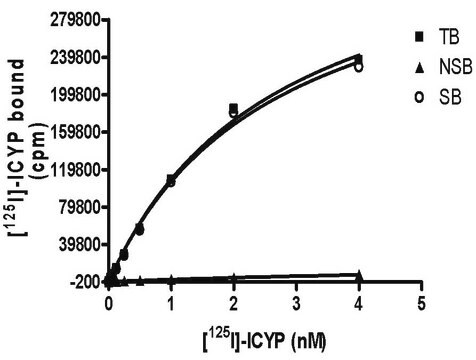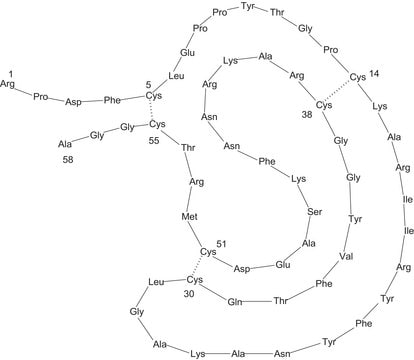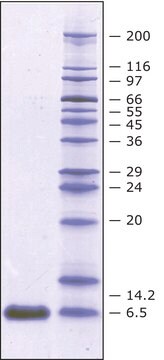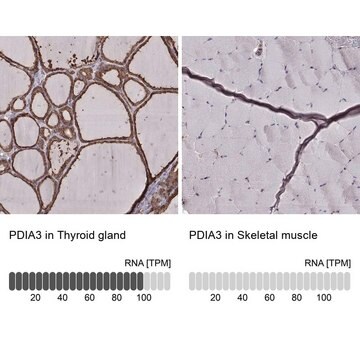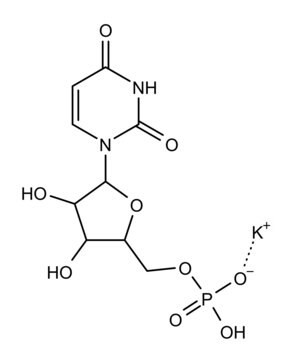HTS083M
ChemiScreen Recombinant Human CCK2 Cholecystokinin Receptor Membrane Preparation
Human CCK2 / CCKb GPCR membrane preparation for Radioligand binding Assays & GTPγS binding.
Zaloguj sięWyświetlanie cen organizacyjnych i kontraktowych
About This Item
Kod UNSPSC:
41106514
eCl@ss:
32161000
NACRES:
NA.84
Polecane produkty
pochodzenie biologiczne
human
Poziom jakości
rekombinowane
expressed in Chem-1 cells
producent / nazwa handlowa
ChemiScreen
Chemicon®
metody
ligand binding assay: suitable (GTPγS)
radioligand binding assay (RLBA): suitable
numer dostępu NCBI
numer dostępu UniProt
Warunki transportu
dry ice
informacje o genach
human ... CCKBR(887)
Opis ogólny
Cholecystokinins are a series of peptides of heterogeneous length (5 to 58 amino acids) that are derived from preprocholecystokinin and are found in gastrointestinal tissues and the central nervous system. Gastrin is a related peptide with 5 C-terminal amino acids identical to those of cholecystokinin. Two GPCRs, CCK1 (CCKA) and CCK2 (CCKB), bind to CCK and/or gastrin to mediate the biological effects of the peptides. CCK2 binds to CCK and gastrin with similar affinity, whereas CCK1 selectively binds sulfated CCK. Binding of ligands to CCK2 stimulates mobilization of intracellular calcium by activation of Gq/11. In the periphery, CCK2 is present in the stomach, where it mediates gastrin-stimulated gastric acid secretion. In the CNS, CCK2 has been implicated in anxiety, depression, schizophrenia, depression and opioid analgesia (Noble et al., 1999). Chemicon′s CCK2 membrane preparations are crude membrane preparations made from our proprietary stable recombinant cell lines to ensure high-level of GPCR surface expression; thus, they are ideal HTS tools for screening of antagonists of CCK2 interactions and its ligands. The membrane preparations exhibit a Kd of 0.47 nM for [125I]-cholecystokinin octapeptide (CCK-8). With 0.3 nM [125I]CCK-8, 5 or 10 μg/well CCK2 Membrane Prep yields greater than 20-fold signal-to-background ratio.
Full-length human CCKB cDNA encoding CCK2
Zastosowanie
Radioligand binding assay and GTPγS binding.
Działania biochem./fizjol.
GPCR Class: A
Protein Target: CCK2 / CCKb
Target Sub-Family: Cholecystokinin
Jakość
Signal:background and specific binding values obtained in a competition binding assay with varying amounts of CCK2 membrane prep:
Specifications:
1unit = 5 μg
Bmax for [125I] CCK-8 binding: 3.47 pmol/mg protein
Kd for [125I] CCK-8 binding: ~0.47 nM
| 10 µg/well | 5 µg/well | |
|---|---|---|
| Signal:Background | 27.4 | 27.8 |
| Specific Binding (cpm) | 25,302 | 20,111 |
Specifications:
1unit = 5 μg
Bmax for [125I] CCK-8 binding: 3.47 pmol/mg protein
Kd for [125I] CCK-8 binding: ~0.47 nM
Charakterystyka techniczna
Inucbation Conditions
Membranes are mixed with radioactive ligand and unlabeled competitor (see Figures 1 and 2 for concentrations tested) in binding buffer in a nonbinding 96-well plate, and incubated for 1-2 h. Prior to filtration, a GF/C 96-well filter plate is coated with 0.33% polyethyleneimine for 30 min, then washed with 50mM HEPES, pH 7.4, 0.5% BSA. Binding reaction is transferred to the filter plate, and washed 3 times (1 mL per well per wash) with Wash Buffer. The plate is dried and counted.
• Binding buffer: 50 mM Tris, pH 7.4, 10 mM MgCl2, 1 mM EDTA, filtered and stored at 4°C
• Radioligand: [125I]-CCK-8 (Perkin Elmer#:NEX-203 )
• Wash Buffer: 50 mM Tris, pH 7.4 filtered and stored at 4°C.
One package contains enough membranes for at least 200 assays (units), where a unit is the amount of membrane that will yield greater than 20-fold signal:background with 125I labeled CCK-8 at 0.3 nM
Membranes are mixed with radioactive ligand and unlabeled competitor (see Figures 1 and 2 for concentrations tested) in binding buffer in a nonbinding 96-well plate, and incubated for 1-2 h. Prior to filtration, a GF/C 96-well filter plate is coated with 0.33% polyethyleneimine for 30 min, then washed with 50mM HEPES, pH 7.4, 0.5% BSA. Binding reaction is transferred to the filter plate, and washed 3 times (1 mL per well per wash) with Wash Buffer. The plate is dried and counted.
• Binding buffer: 50 mM Tris, pH 7.4, 10 mM MgCl2, 1 mM EDTA, filtered and stored at 4°C
• Radioligand: [125I]-CCK-8 (Perkin Elmer#:NEX-203 )
• Wash Buffer: 50 mM Tris, pH 7.4 filtered and stored at 4°C.
One package contains enough membranes for at least 200 assays (units), where a unit is the amount of membrane that will yield greater than 20-fold signal:background with 125I labeled CCK-8 at 0.3 nM
Postać fizyczna
Liquid in packaging buffer: 50 mM Tris pH 7.4, 10% glycerol and 1% BSA with no preservatives.
Packaging method: Membranes protein were adjusted to 0.5 mg/ml in 1 ml packaging buffer, rapidly frozen, and stored at -80°C.
Packaging method: Membranes protein were adjusted to 0.5 mg/ml in 1 ml packaging buffer, rapidly frozen, and stored at -80°C.
Przechowywanie i stabilność
Maintain frozen at -70°C for up to 2 years. Do not freeze and thaw.
Informacje prawne
CHEMICON is a registered trademark of Merck KGaA, Darmstadt, Germany
Oświadczenie o zrzeczeniu się odpowiedzialności
Unless otherwise stated in our catalog or other company documentation accompanying the product(s), our products are intended for research use only and are not to be used for any other purpose, which includes but is not limited to, unauthorized commercial uses, in vitro diagnostic uses, ex vivo or in vivo therapeutic uses or any type of consumption or application to humans or animals.
Ta strona może zawierać tekst przetłumaczony maszynowo.
Kod klasy składowania
12 - Non Combustible Liquids
Klasa zagrożenia wodnego (WGK)
WGK 2
Temperatura zapłonu (°F)
Not applicable
Temperatura zapłonu (°C)
Not applicable
Certyfikaty analizy (CoA)
Poszukaj Certyfikaty analizy (CoA), wpisując numer partii/serii produktów. Numery serii i partii można znaleźć na etykiecie produktu po słowach „seria” lub „partia”.
Masz już ten produkt?
Dokumenty związane z niedawno zakupionymi produktami zostały zamieszczone w Bibliotece dokumentów.
Nasz zespół naukowców ma doświadczenie we wszystkich obszarach badań, w tym w naukach przyrodniczych, materiałoznawstwie, syntezie chemicznej, chromatografii, analityce i wielu innych dziedzinach.
Skontaktuj się z zespołem ds. pomocy technicznej